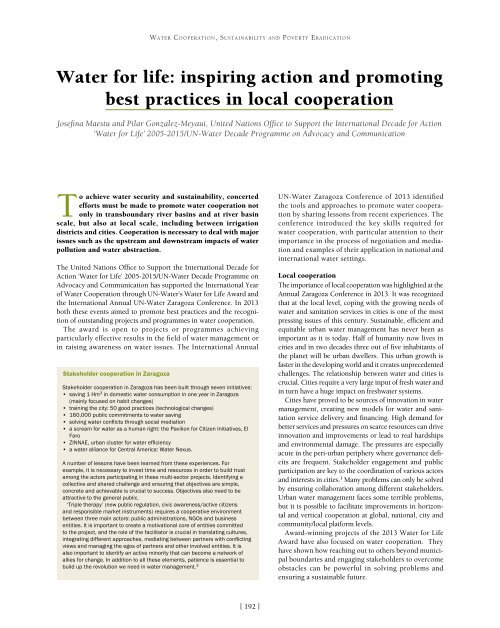222893e
222893e
222893e
Create successful ePaper yourself
Turn your PDF publications into a flip-book with our unique Google optimized e-Paper software.
WATER COOPERATION, SUSTAINABILITY AND POVERTY ERADICATIONWater for life: inspiring action and promotingbest practices in local cooperationJosefina Maestu and Pilar Gonzalez-Meyaui, United Nations Office to Support the International Decade for Action‘Water for Life’ 2005-2015/UN-Water Decade Programme on Advocacy and CommunicationTo achieve water security and sustainability, concertedefforts must be made to promote water cooperation notonly in transboundary river basins and at river basinscale, but also at local scale, including between irrigationdistricts and cities. Cooperation is necessary to deal with majorissues such as the upstream and downstream impacts of waterpollution and water abstraction.The United Nations Office to Support the International Decade forAction ‘Water for Life’ 2005-2015/UN-Water Decade Programme onAdvocacy and Communication has supported the International Yearof Water Cooperation through UN-Water’s Water for Life Award andthe International Annual UN-Water Zaragoza Conference. In 2013both these events aimed to promote best practices and the recognitionof outstanding projects and programmes in water cooperation.The award is open to projects or programmes achievingparticularly effective results in the field of water management orin raising awareness on water issues. The International AnnualStakeholder cooperation in ZaragozaStakeholder cooperation in Zaragoza has been built through seven initiatives:• saving 1 Hm 3 in domestic water consumption in one year in Zaragoza(mainly focused on habit changes)• training the city: 50 good practices (technological changes)• 160,000 public commitments to water saving• solving water conflicts through social mediation• a scream for water as a human right: the Pavilion for Citizen Initiatives, ElFaro• ZINNAE, urban cluster for water efficiency• a water alliance for Central America: Water Nexus.A number of lessons have been learned from these experiences. Forexample, it is necessary to invest time and resources in order to build trustamong the actors participating in these multi-sector projects. Identifying acollective and shared challenge and ensuring that objectives are simple,concrete and achievable is crucial to success. Objectives also need to beattractive to the general public.‘Triple therapy’ (new public regulation, civic awareness/active citizensand responsible market instruments) requires a cooperative environmentbetween three main actors: public administrations, NGOs and businessentities. It is important to create a motivational core of entities committedto the project, and the role of the facilitator is crucial in translating cultures,integrating different approaches, mediating between partners with conflictingviews and managing the egos of partners and other involved entities. It isalso important to identify an active minority that can become a network ofallies for change. In addition to all these elements, patience is essential tobuild up the revolution we need in water management. 3UN-Water Zaragoza Conference of 2013 identifiedthe tools and approaches to promote water cooperationby sharing lessons from recent experiences. Theconference introduced the key skills required forwater cooperation, with particular attention to theirimportance in the process of negotiation and mediationand examples of their application in national andinternational water settings.Local cooperationThe importance of local cooperation was highlighted at theAnnual Zaragoza Conference in 2013. It was recognizedthat at the local level, coping with the growing needs ofwater and sanitation services in cities is one of the mostpressing issues of this century. Sustainable, efficient andequitable urban water management has never been asimportant as it is today. Half of humanity now lives incities and in two decades three out of five inhabitants ofthe planet will be urban dwellers. This urban growth isfaster in the developing world and it creates unprecedentedchallenges. The relationship between water and cities iscrucial. Cities require a very large input of fresh water andin turn have a huge impact on freshwater systems.Cities have proved to be sources of innovation in watermanagement, creating new models for water and sanitationservice delivery and financing. High demand forbetter services and pressures on scarce resources can driveinnovation and improvements or lead to real hardshipsand environmental damage. The pressures are especiallyacute in the peri-urban periphery where governance deficitsare frequent. Stakeholder engagement and publicparticipation are key to the coordination of various actorsand interests in cities. 1 Many problems can only be solvedby ensuring collaboration among different stakeholders.Urban water management faces some terrible problems,but it is possible to facilitate improvements in horizontaland vertical cooperation at global, national, city andcommunity/local platform levels.Award-winning projects of the 2013 Water for LifeAward have also focused on water cooperation. Theyhave shown how reaching out to others beyond municipalboundaries and engaging stakeholders to overcomeobstacles can be powerful in solving problems andensuring a sustainable future.[ 192 ]


